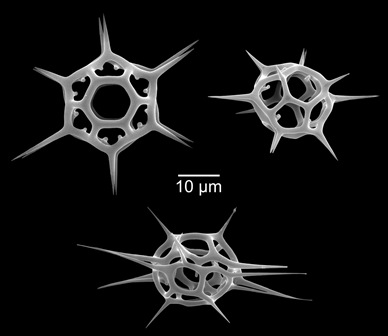Kevin McCartney, University of Maine at Presque Isle Professor of Geology, spent the Thanksgiving week with research colleagues at Yamagata University in Japan. He was invited to present a talk at the Japanese university, titled “Silicoflagellate double skeletons: a summary of recent observations of fossil and modern specimens.” He also worked with several graduate students there on various projects.
McCartney’s research specialty is the silicoflagellates, which are single-celled plants that live in ocean waters. “This group of organisms is significant enough,” McCartney said, “but is generally overshadowed by other groups, such as the diatoms, that are far more important.”
McCartney’s research extends over a period of 30 years and includes nearly 50 peer-reviewed articles in the scientific literature. Much of his recent work has been on the evolution of silicoflagellates during the Cretaceous Period, part of the “Age of Dinosaurs,” and he is now working to extend this knowledge to the early Cenozoic (“Age of Mammals”).
There are very few people in the world who have a good understanding of his group, but there are many specialists of other groups that encounter silicoflagellates of interest. Such scientists sometimes see in their own work unusual silicoflagellate specimens that relate to McCartney’s research. Some of these colleagues work with the scanning electron microscope, which provides especially detailed photographs. The data and photos collected by these colleagues have enabled McCartney to be very productive in the last several years. A recent article that he submitted to a biology journal has a dozen co-authors from eight countries.
McCartney now works closely with colleagues in Japan, Poland, Russia, Italy and other countries who provide information on unusual silicoflagellates. McCartney in turn is assisting in the training of graduate students from several countries. While in Japan, he was asked to be an external member of a Ph.D. student’s committee.
McCartney’s week in Japan included work with a colleague there on two papers, and interaction with several graduate students. These students are doing work in several microorganism groups, and McCartney provided training on silicoflagellates so they can recognize unusual specimens in the future and take photographs. One of these students had already sent McCartney some very interesting photographs, and is co-author to a paper recently submitted to an international journal. McCartney worked on another paper with this student and expects the visit to lead to further collaborative research.
